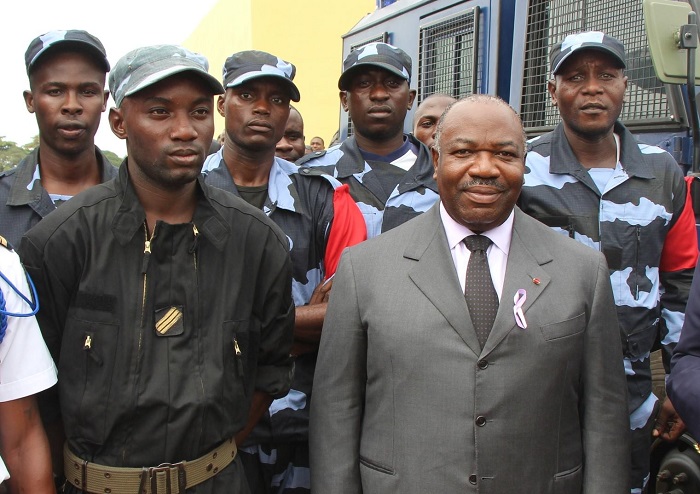
Libreville, Gabon | AFP |
President Ali Bongo of Gabon poured scorn Thursday on opposition supporters who rioted overnight after he was declared the winner of a weekend election his main rival said was rigged.
Three people were killed in the unrest and around 1,000 arrested, the interior minister said.
“Democracy does not fit comfortably with self-declared victory, with small groups trained in destruction,” Bongo said in a short speech from the presidential palace.
“Democracy does not sit well with an attack on parliament,” he said, referring to the national assembly building that was set ablaze Wednesday night.
“The elections have delivered their verdict… Who lost? A small group whose only plan was to take power to make use of Gabon rather than serve it.”
Soon after Saturday’s poll, opposition candidate Jean Ping, 73, said he had won and that any results to the contrary would be fraudulent.
Thousands of angry protesters poured onto the streets of the capital Libreville late Wednesday, accusing the government of stealing the election after Bongo won a second term by a razor-thin margin over Ping.
His victory is set to extend the Bongo family’s almost 50-year rule over the small oil-rich nation.
Ping said two people were killed and 19 hurt in a raid on his headquarters early Thursday.
Another opposition leader, Didjob Ding Duvungui, claimed that between 500 and 600 people had been arrested there. He spoke as he waited to be transferred to police headquarters for questioning along with ten others.
But by mid-morning, security forces had sealed off the city centre, which was calm and otherwise deserted, with troops, police and anti-riot squads patrolling the streets.
‘Excessive force’
Interior Minister Pacome Moubelet-Boubeya said three people had died in the violence and that between 600 and 800 people had been detained in Libreville, and 200 to 300 in the rest of the country.
As Gabon descended into chaos, the EU called for calm, while former colonial power France urged “maximum restraint” and Amnesty International warned against the use of “excessive force”.
Police chief Jean-Thierry Oye Zue said six officers had been injured in the post-vote riots and said there were “very probably” civilian injuries “given the violence with which they attacked us”.
A Red Cross worker who gave his name as Gildas said one of 15 people who were injured and brought in by an army truck had died on Thursday.
It was not immediately clear where Ping — a veteran diplomat and former top African Union official — had taken refuge.
A European diplomat said he was safe, however. Internet communications remained cut-off across swathes of the country.
In Libreville, the parliament building’s facade was blackened by fire and its windows were smashed. Protesters had torn down its huge main gate and torched a sentry box at the entrance.
On the city’s main arterial road, the Boulevard Triomphal — the location of numerous government institutions and foreign embassies — burnt-out buildings and cars could be seen, while makeshift barricades were still smouldering.
A government spokesman said the security operation was to catch the “criminals” and “looters and thugs” responsible for the parliament blaze.
UN Secretary General Ban Ki-moon said police had used “disproportionate” force and called for the release of “political detainees immediately and unconditionally”.
‘He cheated’
The results of the presidential election — which gave Bongo 49.8 percent to Ping’s 48.23 percent, a gap of less than 6,000 votes — remain “provisional” until they are approved by the constitutional court.
The opposition has called for results from each of Gabon’s polling stations to be made public to ensure the credibility of the overall outcome — a demand echoed by the United States and European Union.
Bongo’s spokesman, Alain-Claude Bilie-Bye-Nze, dismissed the demands, saying they broke the country’s election law, which states that results should be broken down by region.
Any appeal by Ping would likely focus on disputed results in Haut-Ogooue province, the heartland of Bongo’s Teke ethnic group.
In Saturday’s vote, turnout was 59.46 percent nationwide but soared to 99.93 percent in Haut-Ogooue, where Bongo won 95.5 percent of the votes cast.
“It’s going to be difficult to get people to accept these results,” one member of the electoral commission told AFP, asking not to be named.
“We’ve never seen results like these, even during the father’s time,” he added.
Bongo took power in 2009 in a violence-marred election that followed the death of his father, Omar Bongo, who had governed the oil-rich former French colony for 41 years.
One-third of Gabon’s population lives in poverty, though the country boasts one of Africa’s highest per capita incomes at $8,300 (7,400 euros) thanks to pumping 200,000 barrels of oil a day.
 The Independent Uganda: You get the Truth we Pay the Price
The Independent Uganda: You get the Truth we Pay the Price



